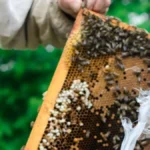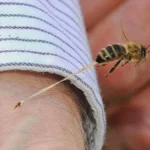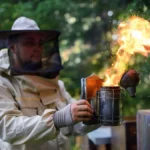Why don’t bees sting beekeepers? I’m going to let you in on a little secret – bees do sting beekeepers, and any good beekeeper doesn’t mind getting a few stings. Stings are really good for you, you just have to learn how to not get stung so much that you get hurt. I work bees without protective gear, and always expect a few stings – this keeps me naughty and strong. In this article, we look at how you can work your bees, as a hardcore beekeeper and not get stung too much. Just enough to keep a twinkle in your eye, and earn your friend’s respect.
Why Do We Remember Our First Sting?
A first sting is a very memorable experience and rightly so – the bees want you to remember and learn an important lesson. Don’t mess with bees. This is an important lesson.
I remember my second birthday party – a swarm of bees moved into our house and my Mom being the legend she is, managed to remove them. A bee remained for my birthday, and as I turned 2, I picked up this beautiful gold and black insect and admired it. And BAM – stung on my little finger and so much pain, tears, wailing and this strong smell or bananas and so on. And thus I spoke my first sentence “Bees sting eina (ouch)”. I know this because my Mom recorded this and sent the transcript to my Grandmother in Canada.
If we imagine a kid, it is a bit like a balloon with dots on it. Each dot is a nerve ending. As you blow the balloon up, the dots get further apart. For a bee, the best time to educate a human, or any other animal, is when it is young and impressionable and has nerves that are very close together. As we get older and bigger, the amount of pain a sting causes actually gets less.
So now we know how bees educate us by teaching us when we are young that bees are a source of incredible pain. Let’s move on and have a look at how beekeepers minimize the number of stings they get.
How Do Beekeepers Not Get Stung (Much)?
The short answer to this is: use smoke, be gentle, and practice. Bees are like any other animal – once you understand the animal, and have worked with it for a while you begin to understand its moods, and you know when it is calm, angry, crazy, or whatever other mood it has.
When you first work with bees, I would recommend wearing a bee suit at first. Once you figure stuff out you can decide if you want the irritation of a suit. There are many types – for a quick run, down have a look here. I would also not recommend wearing gloves. The reason for this is that if you get a few stings on your fingers, this helps you to start understanding and learning how not to irritate the bees.
Why Do You Need A Few Stings When You Start
The human immune system responds to any foreign protein by mounting an immune response over time. Bee stings are a cocktail of chemicals and proteins that cause pain. They trigger an immune response. One of these responses is an allergy response.
If you get a bee sting once a year or so, your chances of developing an allergy are very high – this is because the parts of your immune system that cause problems can overreact. If you receive more regular stings, there are parts of your immune system which dampen the body’s reaction to a sting that will multiply.
Stages Of Developing Immunity To Bee Stings
Do not get a fright here at the numbers – remember, bee stings are not as bad as you think they are. After a while, you get quite used to them. I have been stung 35 000 plus times, and I am writing this article.
Every person will go through these stages of being reactive to stings.
The First Few Stings
It hurts, then a few days later you get itchy scratchy for a while, and it feels like there are lumps inside your skin. After a week or so the swelling subsides.
Stings 20 To 50 Or So
The reactions get less and less. When you start getting close to 50 stings spread over a few months, you will notice that you hardly get the itchy scratchies anymore, and you become less affected by the stings.
Stings 50 Onwards
You are now officially hardcore. Trust me – big scary bikers (who are not beekeepers) will respect you. Bees will sting you, and you may get a little swelling – it still hurts – but you know how to deal with the pain, and you just scrape the stings out and go on doing your stuff.
Your immune system has built up a healthy population of regular cells which regulate your allergy response to bee stings, and this will help to regulate other aspects of your immune system as well.
There is a legend in Africa that the bee man has good circulation. This is because the bees sting him, and it makes his “stinger” strong and hard. In paintings, the bee man is always depicted as this stick figure with an impressive “third leg” robbing hives. There is a reason for this. Science is starting to recognize the benefits of bee stings.

Note the beekeeper collecting honey was “The Man”. It is widely known in ancient cultures that working with bees has benefits for men. This painting is about 2000 years old.

Learn more about: Types Of Bees
How To Not Get Stung Much
We now know that beekeepers do get stung. The trick with being a good beekeeper is to know how to not get stung too much.
How Do Beekeepers Not Get Stung Much?
When we work with the bees there are things that science has not been able to measure yet. Some people have a way with bees. I am one of those people. If I were to try and explain what I do when I work with the bees it goes something like this.
Slow Movements and Smoke
When you are working the hive, you move slowly, with no sudden movements. You use the smoke gently, and puff a toot of smoke here and there as you work. You keep an eye on the bees. If any of the ladies (what we call bees) start to put their abdomens in the air or start bombing your hands, they are about to get angry – give them a toot of smoke and let them calm down.
Know When To Quit
If they do not calm down, then just close the hive up and try again a day later. I would much rather not work bees than have them get angry. When bees get angry the consequences are sub-optimal. If the smoke does not calm them, nothing will. This is much like a man saying to his wife “calm down” – the consequences are dramatic and non-constructive. Never say calm down to anybody, and don’t work bees that do not listen to smoke. This will save you many unpleasant experiences.
Be “Not There”
I remember when I learned this trick, I was in a difficult situation, and the bees were very angry. To put this in perspective I was four stories up, on a scaffolding rig removing a hive. The bees got angry, and I thought to myself “I really wish I was not here”. Suddenly, in my head, I felt like I was not there – like I was far away. There was a guy on the ground who was watching and I imagined what he could see and that I was him.
The bees instantly stopped stinging me and went and stung the guy on the ground. Since then I have always used this trick if the bees get angry – just be “not there” and you feel like you are far away. The bees for some or other reasons don’t “see” you as much then.
Summary
To get honey from a hive, or work a hive without getting stung, use smoke, and move slowly and without sudden movements. Fill your heart with love for the bees, and just imagine you are not right there, but somewhere high above the hive, or over far to the left. Practice feeling like you are not there, and the bees will not get angry with you.
And again, use smoke – a few toots of smoke here and there, to cover everything you do, will make your life easy and pleasant. Remove a frame – toot of smoke. When you are going to put it back – toot of smoke. Open the lid – toot of smoke. Etc.
As you get more and more stings, the effect of the sting on you goes from being a nuisance to being a health benefit. Both men and women will notice major improvements in their cardiovascular system from a few bee stings. A few stings just make the simple things in life a lot more fun. The ancients knew this.
Caution
I have mentioned that bee stings will eventually cause you to become immune to bee stings. It is VERY VERY important to remember that a bee sting overreaction by your body can lead to anaphylactic shock and death.
During the early stages of beekeeping, while you build up your immunity to stings, be very aware of this risk. A small number of people will go through a phase of being susceptible to anaphylactic shock before they become immune to bee stings.
When you work bees in the early days of your beekeeping, have a friend come with you and sit in the car. If you feel funny after being stung – specifically short of breath and dizzy, close the hive and go back to the car. Lie in the back seat with your head up against one door and your feet up against another door. Take a Telfast.
Go as quickly as possible to a doctor or ER. If conditions worsen, and you start to feel faint, or cannot breathe, seek medical attention. These reactions are very rare, but, in the event that you are the unlucky person, it is good to know what to do. I have been that unlucky person very early in my life, and now 35 000 stings later I am completely immune to stings.
We hope this article has helped. Now that you know the secrets to not being stung too much, go and practice. I guess there is a certain irony in learning how to not get stung much by a guy who has been stung 35 000 or more times (not I did not count, this is just an estimate based on weekly average sting counts since 1996). If you found this fascinating, please share.
I have worked bees for three decades like this and can still tell the story.
Read more about: Can Bees Bite Humans?

Dr. Garth A. Cambray is a Canadian/South African entrepreneur and beekeeper with 28 years of experience in apiculture and specializes in adding value to honey. His Ph.D. research developed a new advanced continuous fermentation method for making mead that has resulted in a number of companies globally being able to access markets for mead. His company, Makana Meadery, exports honey mead to the USA where it is available to discerning connoisseurs. He has also developed technologies to commercially manufacture organic honey vinegar in Zambia for export globally. He holds a few patents globally in the ethanol industry and believes in technology and knowledge transfer for human development and environmental sustainability. One of his proudest achievements is the fact that the wind farm he started at one of his old apiary sites has essentially made his hometown carbon neutral.






